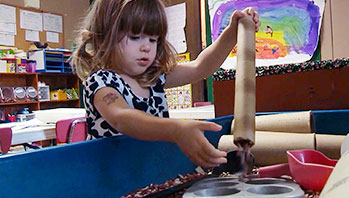- clean recycled plastic bottles/jugs of various sizes and shapes
- plastic containers of various sizes
- plastic measuring cups
- pour
- shape
MA Standards:
Language/L.PK.MA.6: Use words and phrases acquired through conversations, listening to books read aloud, activities, and play.
Speaking and Listening/SL.PK.MA.1: Participate in collaborative conversations with diverse partners during daily routines and play.
Mathematics/Counting and Cardinality/PK.CC.MA.5: Use comparative language, such as more/less, equal to, to compare and describe collections of objects
Head Start Outcomes:
Logic and Reasoning/Reasoning and Problem Solving: Classifies, compares, and contrasts objects, events, and experiences.
Language Development/Expressive Language: Engages in communication and conversation with others.
PreK Learning Guidelines:
English Language Arts/Language 2: Participate actively in discussions, listen to the ideas of others, and ask and answer relevant questions.
Flowing Water

© Commonwealth of Massachusetts, Department of Early Education and Care. All rights reserved.
Skill Focus: Fine Motor Skills, Math, Vocabulary
Make available a variety of clean, unbreakable containers for children to use. Invite them to explore by filling and pouring water in the containers. Set up “water table rules” to guarantee safe explorations.
As they explore, prompt the children to describe what they are doing and what they observe. Ask questions, such as, What is happening? How did you get water in there? Which container holds the most water? How do you know? What happens if you pour all the water from a big bottle into a small cup? How many small cups does it take to fill the biggest container? Do any containers hold exactly the same amount of water? What shape is the water in that container?
Safety Note: Be sure to clean and disinfect the water table and the plastic containers daily and fill the table with fresh water each day.
Educator Tip: Be sure to have plenty of towels and/or a mop handy for clean-up of spills.
